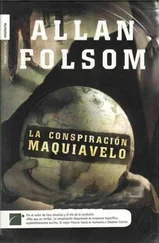The thing was, no matter how concerned he was about the plight of the Equatorial Guinean people, he knew he dared not show too much personal interest in the war itself because to do so would risk pricking up ears in the national and international intelligence and diplomatic communities. They would be more than curious to know why he had singled out that one area when so many other parts of the African continent were suffering under similar circumstances, and they might well send people to look into it. That was something he couldn’t afford. The last thing he needed was to have covert interests poking deeper into what was going on and risk having one of them come up with the photographs before they were safely in his or Joe Ryder’s hands.
Having such far-reaching power and for so many reasons not being able to draw on it was one of the hells of his office and made the trouble with Marten all the worse. Six weeks earlier he would have sent Hap Daniels, his Secret Service special agent in charge, a man he trusted completely and who knew Marten well, to Berlin to sift through the goings-on. Daniels was canny enough and experienced enough to find a way to let Marten know he was there and where to find him without the police or anyone else learning about it, no matter how deeply Marten was hidden. Once contact was made, Daniels could get him the hell out of there, and then both could go after the photos. But in the those six weeks Daniels had undergone heart bypass surgery, and he was at home on medical leave and in no shape to be working that kind of assignment. David Watson, his replacement, was a likable, able man but one Harris didn’t know well enough to send on a mission that would be delicate at best. Moreover, Marten didn’t know him at all and so would have no reason to come out of hiding even if Watson made himself known. That left no one at all the president could turn to for help.
“Dammit,” Harris swore out loud then glanced at his suit coat thrown over the seat across from him. He’d put it there himself, making sure it was in reach. Tucked into an inside pocket was the thing he’d carried everywhere since he’d left Washington: the cheap slate gray cell phone that was his direct and only connection to Nicholas Marten. That was, if Marten called, because he had no way to contact the throwaway cell phone or phones Marten would be using.
He’d hoped all the while Marten would get in touch with him, but he hadn’t. Probably because of the police, or because he was hurt, or even-he hated to think-dead. Or maybe he was just in a situation where phoning anyone was not possible. Or maybe because he had nothing to tell him. What was the thing he’d said when they’d last spoken? “I’ll call you when I have something to report.”
Whatever the reason, the gray phone remained silent, and the stillness was gut-wrenching. It was more than the urgency to find the photographs, or the gnawing reminder that it was he who had sent Marten to Equatorial Guinea in the first place. The thing was he cared about Nicholas Marten enormously. What they had been through together, barely a year earlier in Spain and the close friendship that had come out of it, made them almost like brothers. More than anything he wanted him out of harm’s way. It made him think what it must be like for a parent of a missing child, imagining the worst and waiting and hoping and praying that the phone at your elbow would suddenly come to life and that your daughter or son would be on the other end with a “Hi, Mom” or “Hi, Dad,” all perky and safe and sounding as if nothing at all had happened.
“Damn it to hell,” John Henry Harris spat out loud to the smooth, indifferent walls of Air Force One’s presidential cabin. Then he stoically reached for a breakdown of the federal budget and went to work.
POTSDAM, 6:20 P.M.
Marten, Anne, and Hartmann Erlanger stood in an open field near Erlanger’s van shading their eyes from a late-afternoon sun that at long last had poked through the drizzle and overcast. Their attention was on a twin-engine Cessna 340 as it dropped down through broken clouds, then flew at treetop level until it neared the far end of a private airstrip. Seconds later its landing gear touched the tarmac and it roared past them, giving them a glimpse of its fuselage registration, D-VKRD. The aircraft slowed as it reached the end of the runway, then turned and came back toward them.
“Piston engine. It’s the best I could do, all things considered.” Erlanger crushed a cigarette butt under his heel, then picked it up and put in his pocket. “It will get you wherever you’re going within the parameters you gave me. Maybe not as fast as you would like, but you’ll get there just the same.”
“It’s fine, Hartmann, thank you,” Anne said.
He looked at her the way he had in his study earlier, and she smiled and put a hand to his cheek. Plainly there was a history between them, one they didn’t seem to mind sharing, to a degree at least, with Marten. How profound it was, or if Erlanger’s wife was aware of it, there was no way to know.
The roar of the Cessna’s engines deafened as it neared and came to a stop. Then the pilot shut them down, and for a moment the silence was almost as profound. Almost immediately the chirp of birds and the buzz of insects filtered back. All around was deep forest. The only cuts through it were the airstrip itself and the gravel road they had come in on. Not once had Erlanger brought up the subject of whose property it was, but clearly he had access to it.
The pilot’s door opened, and a woman in a flight suit climbed down. She was blond, maybe thirty-five, and attractive in a matronly sort of way.
“Her name is Brigitte,” Erlanger said. “Tell her where you want to go and she’ll get you there. Don’t tell me, I don’t want to know. Neither of you saw me. None of this took place.” Abruptly he turned to Anne, the warmth and tenderness of moments before suddenly gone, replaced instead by a cold professionalism. “Stay away from the old contacts,” he warned. “You got away with it once. For your sake, don’t try it again.” He stared at her for a moment longer, then glanced at Marten and turned and walked to the van. Seconds later he got in and closed the door, then started the engine and drove off.
Never once did he look back.
6:50 P.M.
BERLIN POLICE HEADQUARTERS. 7:05 P.M.
Hauptkommissar Franck took the call on his private cell phone and immediately left the room. Detectives Bohlen and Prosser and the dozen other top investigators with them stopped what they were doing as he went out, watching in silence as the door closed behind him. They’d spent the last eight hours shoulder to shoulder with the Hauptkommissar in the dark of this high-tech situation room deep inside the building surrounded by rows of computers with floor-to-ceiling monitors sorting through mountains of information provided by officers tracking reports coming in from the field.
Franck had called them there just after ten thirty in the morning when the all but certain capture of Nicholas Marten and Anne Tidrow in the neighborhood near the Friedrichstrasse/Weidendamm Bridge had failed. The Hauptkommissar had faced them angrily and forcefully, dressing them down and citing their failure and his own, clearly and harshly.
“I was put in charge of this operation,” he’d said. “I am responsible for the decisions that failed. The suspects are still at large. Failure a second time is not acceptable. To me, to you, or the people of Berlin and Germany. I hope that is quite clear.”
The effect had been powerful and shaming and embarrassing, putting everyone on edge and spreading through the entire department within minutes. It was why, when he answered his personal cell phone and so abruptly left the room, the people there held their collective breath. Perhaps it was a major breakthrough, a tip from one of the untold number of informants only the Hauptkommissar knew. Perhaps in short order he, and then they, would learn where the suspects were and as quickly mobilize and within the hour bring the entire ordeal to a close.
Читать дальше












